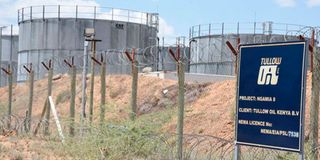Tullow submits new plan for Turkana oil fields

Tullow Oil facility at Ngamia 8 in Lokichar, Turkana County, on February 18, 2020. Tullow Oil and its joint venture partners Total Energies and Africa Oil last week submitted a revised field development plan (FDP) to the government for approval, as the venture steps up its search for a strategic investor.
Tullow Oil and its joint venture partners Total Energies and Africa Oil last week submitted a revised field development plan (FDP) to the government for approval, as the venture steps up its search for a strategic investor.
The approval of the FDP—which will need to be ratified by Parliament —will enable the venture to get a government license to commence commercial drilling of crude oil in the 10BB and 13T oil blocks in Turkana County.
“Since January 1, 2022, there have been ongoing discussions with the government of Kenya on approval of the FDP and securing government deliverables. An updated FDP was submitted on March 3, 2023, and is being reviewed by the government of Kenya before ratification by the Kenyan Parliament,” said Tullow.
The country first announced the discovery of oil in March 2012.
The venture had been issued with a 15-month license extension from September 2020 to December 2021 on the condition that they would submit to the government an FDP that is technically and commercially viable for approval.
While the initial FDP was submitted in December 2021, the revised plan follows the revelation that the commercially recoverable oil from the reserves is significantly larger than previously estimated.
Revise production capacity
An audit by British petroleum consulting firm Gaffney, Cline & Associates led the firms to revise the production capacity of the oilfields to 120,000 barrels of oil per day (bpd), up from previous estimates of 70,000 bpd.
This saw the revision of the FDP that has increased the size of the crude oil processing facility in Turkana and the size of the pipeline to evacuate the oil to Lamu, increasing the projected cost of the project from Sh319 billion to Sh377 billion.
The revised FDP also increased the diameter size of the planned Lokichar-Lamu crude oil pipeline from 18 inches to 20 inches to handle a higher product volume and drilling of additional exploration wells.
“The Group expects a production license to be granted once due government process has been completed,” said Tullow.
The Kenya oil project has faced long delays owing to uncertainty over access by the venture to land and water critical for oil drilling and laying of the oil pipeline. The firms have also been having cold feet over the project owing to uncertainties in the global crude oil market that could lead to low prices of the commodity, rendering it less commercially viable.
Media reports last year indicated that the Indian Oil Corporation is considering buying a stake in the venture, which would pump in significant cash that will give a new lease of life into the project.
The company is India’s largest oil refiner.
Tullow has previously attributed production delays to several factors, including unfavourable global oil prices, approval delays for land and water rights, a tax dispute and the Covid-19 pandemic.





